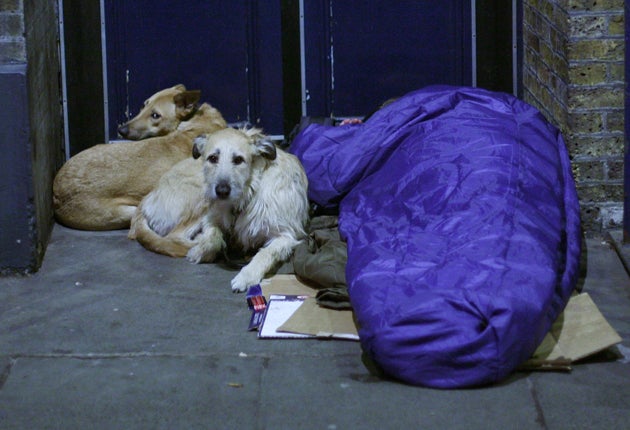Homeless turn to A&E for help
NHS reports increase in admission of rough sleepers with addiction problems

The problem of homeless people sleeping on Britain’s streets may have been transferred to hospitals, according to a new study.
Although the Government claims that the number of people sleeping rough has fallen by three-quarters since 1988, figures obtained from 173 hospital trusts under the Freedom of Information Act reveal mounting pressure on the NHS from the homeless.
In England, a homeless person is admitted to hospital for problems related to drugs or alcohol every three hours. A total of 13,872 people with “ no fixed abode” were admitted to hospital over the last five years for drug or alcohol misuse. Total drug and alcohol related admissions of homeless people have risen by 117 per cent since 2004.
The stastistics were obtained by the Conservative Party’s Homelessness Foundation, which includes the Shelter, Crisis and other homeless charities.
In a forthcoming report, seen by The Independent, the group says that six out of 10 hospital trusts have seen drug and alcohol-related admissions among the homeless rise in the last five years. More than 10 per cent of these patients were young people; in some areas up to 40 per cent of those admitted were under 25.
The report says: “Alcohol and drug dependency is, in many cases, what has led people to the streets but it also creates a vicious circle which makes the process of finding accommodation that much more difficult. The side-effects, both medical and non-medical that come with regular abuse of drugs and alcohol makes it virtually impossible for these most vulnerable of people to seek help. Appointments are missed, the lack of an address makes registering for help difficult and turning towards crime becomes ever more likely.”
The report says that recent change to the method of counting rough sleepers appears “slanted rather more towards political objectives” of getting the numbers down rather than the reality reported by homelessness groups.
Grant Shapps, the shadow Housing Minister, said: "Failing to confront the extent of homelessness in the United Kingdom leaves our frontline services like the NHS struggling to cope. Our report demonstrates how drugs and alcohol often play a major role in perpetuating the chaotic lives lived by people trapped in homelessness. It’s time to introduce policies that could start to make a difference like targeting cut price high strength larger sold by supermarkets at less than it costs to buy a bottle water."
The Department for Communities and Local Government said last night: " We recognise that there is more that needs to be done to meet the complex needs of rough sleepers, which is why through our ‘No One Left Out' rough sleeping strategy we are working with the Department of Health to further improve their access to health and social care services. "
A spokesman said homeless people should be helped by personalised support packages addressing all areas of their lives and should be discharged from hospital to appropriate accommodation.
Some 39 per cent of rough sleepers have an alcohol problem and 42 per cent a problem with drugs. The Salvation Army believes the Government’s alcohol policy is failing the homeless, as it focuses on binge drinking, rather than aiming to address the underlying health problems caused by alcohol.
Join our commenting forum
Join thought-provoking conversations, follow other Independent readers and see their replies
Comments
Bookmark popover
Removed from bookmarks